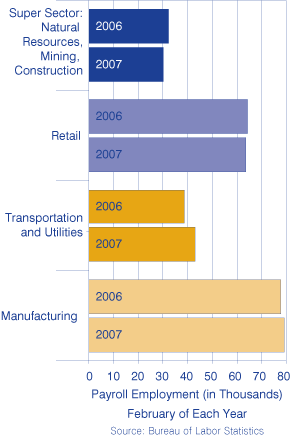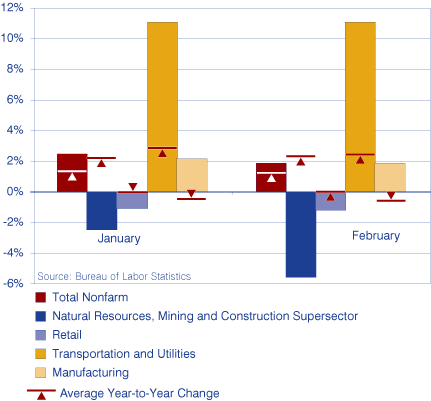Louisville Metro Continues to Add Jobs
The Louisville metro economy (including Indiana's Clark, Floyd, Harrison and Washington counties) continues to add payroll jobs at a relatively healthy pace, adding 15,000 jobs from January 2006 to 2007. This 2.5 percent increase is impressive, especially compared to the 16-year average of 1.3 percent during that time frame.
The strength of the local economy can also be seen in the change from December to January total payrolls. The average decrease in employment from December to January was 2.8 percent, while this past year's decline was only 1.9 percent (note: data in this article are not seasonally adjusted).
A small caution, however, rests with the January to February 2007 numbers, with employment growth from January to February of this year slightly negative compared to the 16-year average of 0.35 percent.
Industry View
Despite overall healthy job growth in the Louisville metro, the housing slump has negatively impacted employment in the construction and retail sectors.
In the natural resources, mining and construction supersector, 800 jobs were lost from January 2006 to 2007. Meanwhile, February numbers show a continued decline of about 1,800 jobs (see Figure 1). The typical increase in employment for that supersector from January to January is about 2.1 percent, but this past year showed a 2.5 percent decline (see Figure 2).
Figure 1: Louisville Metro Payroll Employment, February 2006 to 2007

Figure 2: Percent Change in Payroll Employment in the Louisville Metro, 2006 to 2007

Retail sector jobs decreased compared to natural resources, mining and construction. The average year-to-year change in retail employment for the first two months of the year is almost flat, but this past year we observed declines of approximately 1 percent. Similar declines were observed in 2001, the last recorded recession.
We are seeing very healthy gains in transportation and utilities. From January to January, the Louisville metro added approximately 4,300 jobs. This translates to an 11 percent gain in employment, compared to an historical average of 2.7 percent.
Despite slowdowns in construction and minor declines in retail employment, the Louisville metro economy continues to add jobs. Even manufacturing, a sector that typically sheds jobs from January to January, added almost 2,000 jobs, a 2.2 percent growth. This compares to an average 0.5 percent decrease for January to January manufacturing payroll activity.
Despite local job growth, some potentially troubling signs across the country could slow down the local economy. Declining consumer sentiment across the nation and declines in durable goods orders could have further adverse impacts on local retail, potentially erasing some of the gains in local manufacturing employment. Additionally, food and energy prices continue to surge, which could also dampen consumer spending and apply greater pressure on the retail sector.
Uric Dufrene, Sanders Chair in Business
Indiana University Southeast
